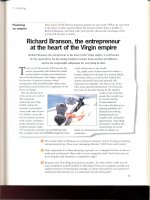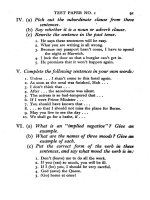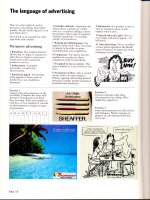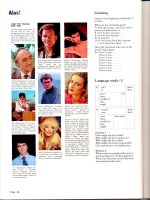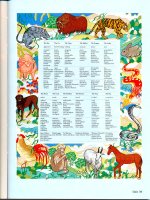Times zones level 4 second students book
Bạn đang xem bản rút gọn của tài liệu. Xem và tải ngay bản đầy đủ của tài liệu tại đây (23.25 MB, 148 trang )
NATIONAL
Ne
X*
RĐU
CENGAGE Ì'
Learning-
))0)0 000cc
LEARNING
Ld
Learning
\
David Bohlke
Jennifer Wilkin
SECOND EDITION
[
NATIONAL
GEOGRAPHIC
LEARNING
NATIONAL
7
LEARNING
*>
GEOGRAPHIC | <_
CENGAGE
Learning’
Time Zones Student Book 4
Second Edition
David Bohlke and Jennifer Wilkin
Publisher: Andrew Robinson
Senior Development Editor: Derek Mackrell
Development Editors: ian Mavor,
Charlotte Sharman
Assistant Editor: Melissa Pang
Director of Global Marketing: lan Martin
Product Marketing Manager: Anders Bylund
Media Researcher: Leila Hishmeh
Senior Director of Production:
Michael Burggren
Senior Content Project Manager:
Tan Jin Hock
Manufacturing Planner:
Mary Beth Hennebury
Compositor: Cenveo Publisher Services
Cover/Text Design: Creative Director:
Christopher Roy, Art Director: Scott Baker,
Senior Designer: Michael Rosenquest
Cover Photo: Natural History Museum,
London, England: Massimo Borchi/Atlantide
Phototravel/Corbis
Copyright © 2016 National Geographic Learning, a part of Cengage Learning
|
ALL RIGHTS RESERVED. No part of this work covered by the copyright herein
may be reproduced, transmitted, stored or used in any form or by any means
graphic, electronic, or mechanical, including but not limited to photocopying,
recording, scanning, digitizing, taping, Web distribution, information networks,
or information storage and retrieval systems, except as permitted under
Section 107 or 108 of the 1976 United States Copyright Act, without the prior
written permission of the publisher.
For permission to use material from this text or product,
submit all requests online at cengage.com/permissions
Further permissions questions can be emailed to
Student Book with Online Workbook:
ISBN-13: 978-1-305-51074-6.
Student Book:
ISBN-13: 978-1-305-25987-4
National Geographic Learning
20 Channel Center Street
Boston, MA 02210
USA
Cengage Learning is a leading provider of customized learning solutions with
employees residing in nearly 40 different countries and sales in more than 125
countries around the world. Find your local representative at:
www.cengage.com
Cengage Learning products are represented in Canada by Nelson Education, Ltd.
Visit National Geographic Learning online at NGL.Cengage.com
| Visit our corporate website at www.cengage.com
Printed in the United States of America
Print Number:
01
Print Year: 2015
Scope and Sequence.
Unit 1
| Love Making Jewelry!
6
Unit 7
It Might Have Been a Temple.
Unit 2
Unit 8
How Long Have You Been
It’s Taller than the
Playing Cricket?
16
Unit 3
You Could Ask for Advice.
Unied
The Koala Was Taken to
a Shelter.
76
Unit 9
26
36
Unit 5
How Was It Formed?
Eiffel Tower!
...66
He a Great Director,
Isn't“t He? He?
86
Unit 10
| Wish | Could Be an Athlete!.....96
Unit 11
46
Unit 6
What Would You Do?
106
Unit 12
Look at That Narwhal!
56
Student B Activities
Table of Irregular Past Tense Verbs
126
133
Language Notes.
134
You Should Eat More Fruit!
Photo and Art Credits
Acknowledgments
116
142
143
Mire
Unit
PE
AND'SEQUENCE.
| Functi
Talking about
hobbies and
interests
Real English:
Grammar
Gerunds:
She likes watching movies.
enjoy cooking.
Does he like doing puzzles?
Read, Write,
Hobbies
Interests
Intonation in
statements,
questions,
exclamations
Tell me about it!
Reading:
By the Numbers
Writing:
Description
Video:
Robot Games
[Love
Making Jewelry!
Page 16
2
How Long Have You
Been Playing Cricket?
Page26
s3
3
Identifying
different sports
Describing
‘one's sports
activities
Real English:
4
Modals:
Real English:
Verbs with try:
try telling, try asking
You know
5
should, could, would
Problems
and advice
Weak forms
of should and
could
Real English:
It’s up to you.
Passive voice without an
agent:
An injured animal was brought
into the shelter yesterday.
The cats were checked for any
Wild
animals
Animal
Intonation in
aseries
Page 56.
Talking about
the importance
of conserving
marine animals
and their
habitats
Real English:
You're telling
me...
The rock was broken apart by
ice.
Non-restrictive relative
clauses:
The narwhal, which is a type of
whale, has a long, straight tusk.
My uncle, who visits every
summer, is a marine biologist.
Reading:
Bear Rescue
News article
Video:
Animal Portraits
medicine?
by the sea.
Writing:
Letter
Writing:
rescue
Is an injured animal given
Passive voice with an agent:
Valleys are formed by glaciers.
The beach is being washed away
Reading:
Vision of Hope
Eco-Fuel Africa
injuries.
Describing the
formation of
natural
landscapes
Real English:
North American
Video:
Why don’tyou...
Iflwere you...
Talking about
animal rescue
Reading:
Life Rolls On
advice:
How Was It
Formed?
Look at That
Narwhall
for
Other expressions for giving
There itis.
6
'Weak form of
been
lately
recently
Asking for and
giving advice
Sports
Adverbs of time:
since
The Koala Was
Taken to a Shelter.
Page 46
She's been working hard.
Ive been playing badminton.
Give ita try.
You Could Ask for
EF Advice.
Page36
Present perfect progressive:
Natural
formations
Phrasal
verbs
Contrastive
stress
Reading:
Cave of Secrets
Writing:
Tourist guide
Video:
Mountain River Cave
Marine
animals
Relative
clauses
Reading:
Cities in the Sea
Writing:
Formal letter
Video:
Saving Our Reefs
Functions
Talking about
7
It Might Have Been
a Temple.
Page 76
possibilities
Talking about
phenomenons
Talking about
man-made
It’s Taller than the
} Eiffel Tower!
10
Talking about
movies, actors,
and the movie
industry
Real English:
Same here.
11
Video:
Tutankhamun
Comparative and superlative
adjectives
Other expressions:
It’s too cloudy.
She's old enough to drive.
| Man-made
structures
and
Emphatic
stress
wonders
Benedict Cumberbatch is sucha
great actor, isn’t he?
You haven't seen the new Star
Wars movie, have you?
12
You Should Eat
More Fruit!
SeaOrbiter
Poster
The Oasis of the Seas is just as
Tag questions:
Reading:
Writing:
Video:
Green Museum
Movie
genres
Evaluating
Intonation in
tag questions
movies
Reading:
Our Attraction to
Fright
Writing:
Movie review
Video:
Walk of Fame
Talking about
wishes and
hopes
Real English:
Doyou mean...?
Making wishes:
Iwish I could speak any
language well.
Wishes
Contractions:
‘dand ‘I
Essay
If you were rich, would you use
the money to travel?
Video:
RoboBees
Where would you go if you could
go anywhere in the world?
Discussing
dilemmas
Language review
Reading:
Making a Difference
Writing:
Second conditional:
Moral
dilemmas
Final tor d
with initial y
Reading:
Thought Experiments
Writing:
Persuasive essay
What a relief!
Video:
Test of Character
What Would
J You Do?
Page 116
Reading:
Maya Mystery
Writing:
Short essay
artifacts
tall as the Allure of the Seas.
| Wish | Could Be
an Athlete!
Page 106
Reduction:
have
Check this out!
That's too bad.
| Page 96
Ancient
civilizations
and
civilizations
Real English:
Real English:
He’s a Great
Director, Isn’t He?
Modals for probability:
could, might, must
Vocabulary
and ancient
wonders:
Page 86
Grammar
Talking about
health and
nutrition
Real English:
Any ideas?
Language review
Health and
nutrition
Pausing
between
thought
groups
Reading:
Your Amazing Brain
Writing:
Action plan
Video:
Space Food
Preview
OED
Listen to the conversations. Match the people (Jeff, Maria, Zac,
and Wendy) to their hobbies. Write J, M, Z, or W.
"mm...ee
making jewelry __
OBD
building models _____
baking __
Listen again. Complete the chart.
Ầ
WHERE
WHEN
G
Jeff
on Wednesdaus
Maria
on the weekends
Zac
in the school cafeteria
(B8)
@
writing a blog ___
at her aunt's place
Talk with a partner. Do you have any hobbies? What do you like doing?
| like reading comic books.
How many comics do you have?
lonly have about 30, but I've read over 200!
;
Z
Language Focus
Listen and read. Then repeat the conversation
and replace the words in blue.
RN
is
ENGLISH TT
me about it
) Practice with a partner. Replace any words to make your own conversation.
How about a game
I'm kind of
bored. Do you
vy
\
|
of backgammon?
Not really.
\ don't really like
board games.
I'm not
very good
at puzzles.
feel like doing
\ a puzzle?
| know! We both enjoy playing
sports. We can go skiing!
ƠÍ I love skiing!
But it’s the
:
middle of
\
about it! Is
it time fora
break yet?
is exhausting
sure takes a lot of energy
(TALKING
She
ABOUT
HOBBIES
likes / loves
playing the drums.
|
They
enjoy / don’t
Does he like doing puzzles?
8
INTERESTS )
watching movies.
He
Á_-
AND
Do you like skiing?
Unit1
like
cooking.
jogging.
Yes, he does.
No, I can’t stand it.
xà:
I don’t mind it.
_
Complete the conversation. Use the correct forms of the verbs. Then listen
and check your answers.
hike
perform
play
join
stay
Kara:
Hey, Paulo, have you signed up for any after-school activities yet?
Paulo:
No, not yet. | love singing, so | might look into (1) ___
theater club.
Kara:
That would be fun! You like acting, and you're a good singer.
Paulo:
Thanks. The problem is I’m not a good dancer. I'm always stepping on other people's
the musical
the guitar.
toes. Hey! Maybe you should try out. You like (2) ___
Kara:
_Me?Nothanks.(3)__—————
—
Paulo:
Well, there’s the yoga club.
in front of people makes me nervous.
Kara: _ No way! | can't stand yoga. Plus, (4)_—————————
school doesn’t sound like fun!
inside even longer after
Paulo:
So why don't you join an outdoors club? Do you like(5)_————————?
Kara:
That's a great idea! | love the outdoors.
T193
Listen to the conversation. What does each person think of the
activities below? Write ©, ©, or ®.
(=
LUCIA
WES
>
baking
swimming
singing
\ playing video games
_
Talk with a partner. Look at the activities in D. Do you like
those activities? Why or why not?
| like singing. It makes me feel relaxed.
C3
The Real World
Extreme
|
Ea
35
Collectors
sử
kíị
Americans spend about $75 billion on
their hobbies each year. Some people
enjoy collecting things as a hobby, and
they sometimes spend a lot of time
and money on it.
Listen. Circle T for True
or F for False.
1. Dave shares videos of his collection online.
2. Dave's wife wants him to buy fewer action figures.
3. Alex collects cards of different baseball players.
4. Dave and Alex are spending less time and money on their hobbies now.
Listen again. Complete the chart.
SIZE OF
COLLEC
VALUE OF
COLLEC
TIME SPENT
HOBBY
ON
Pronunciation
Intonation
in statements,
questions,
exclamations
Listen and repeat.
1. He hates singing.
2. He hates singing?
3. He hates singing!
mm
Listen. Complete the sentences with a period (.), question
mark (?), or exclamation mark (!).
1. Antonio loves playing video games —__
People in _____ spend the
2. Fred hates doing word puzzles ___
most amount of time on
leisure activities.
3. Sarah doesn’t mind doing the dishes ___
a. the United States
b. Spain
4, Peter can’t stand shopping —__
c. New Zealand
5. Yun likes baking —__
three other students. Ask follow-up questions. Write their names
=)
:
(NAMES
I like playing
l enjoy hanging out at_____.
| love watching
I don’t mind helping out with ____
at home.
| don't like playing
Ilove_—————— onweekends.
\ lenjoy listening to ___.
_
Do you like playing tennis?
Goa
Oh, me, too! How often do you play?
Unit?
11
Reading
@
Look at the charts. Check (⁄) the information about teens that is shown.
(3)
@
club involvement
O
O
time spent reading
changing trends in leisure time
Skim the article. Choose the most suitable header for each section.
Z
C
a. More Friends,but More AloneTime
°_
b. Effects ofTechnology
°_
c. Remaining Active
6
Talk with a partner. How much time each day do you spend using a computer or other
electronic devices for leisure?
Teenagers in the United States—like teens in
many countries—have more leisure time
today than ever before. But over a number of
decades, there have been some changes in
how teenagers spend their time after school.
Participating in school clubs remains a
oe common after-school activity. According to
a study, the three most popular types are sports
clubs, performing arts clubs, and academic
clubs—the same as 20 years ago. While overall
participation in these clubs has gradually
dropped over the last two decades, this does
Teens today are more likely to volunteer or
work with neighborhood or community groups.
High school seniors are thinking about college.
They want a competitive college application
that includes a variety of experiences. They
know that academic grades, school activities,
and community involvement are all important
when applying to college.
not mean that students are less active.
1991
¡Chart1:School
Club Involvement
: Among
High
¡ School Seniors
: (Percentage Decrease)
12
Unit1
Academic
Clubs
Athletic
Clubs
Performance
Arts
School
Publications
Other School
Clubs/Activities
24%
:
12%
9%
9%
O
Calling and texting are the most popular
modes of communication among teens. Teens
also connect with friends online through social
media. 92% of American teens go online every
day. 71% use more than one social networking
While the kinds of activities that students
participate in school have not changed.
greatly, high school teens now
spend their
leisure time out of school in very different ways
For example, teens today are less likely to visit
a friend in person than 20 years ago. And—
perhaps unsurprisingly—they are far less likely
to read a print newspaper or magazine.
site, with Facebook and Instagram being the
most popular platforms.
A study in 2011
showed that 29% of teens talked to friends
every day through social networking sites.
This trend is likely to continue; between 2006
and 2011, messaging through social media
One of the reasons for these changes is access
to technology. Teens today have greater access
to the Internet, and it has increasingly become
their main channel for socializing and getting
increased from 21% to 29%.
information.
Chart 2: Most Popular
Social Media Platforms
Snapchat
CO
ry
l1
Google+
Vine
=
Tumblr
Other
DO LESS TODAY THAN
THREE DECADES AGO?
The list is long:
= watching TV
= going to movies
= meeting friends
= reading
= writing
= going to the mall
They may have more
FRIENDS
than ever before, but
they actually spend
more of their time
ALONE
—
these days.——
Chart 3: Changes in Leisure Time Use
Among
8 Tơ
5 h
High School Seniors
Watching TV
Going to
3 70
B co
50
fe
40
88 8
What leisure activities do teens
\\Hanging out
os
e
Volunteering
with friends
2001
2011
‘Source CIRCLE Werking Paper 80 by Ke Kawashima-Ginsberg (ncivicyouthcxg)
The world of the teen
has moved online, and
it’s likely to stay there.
Unit1
13
Comprehension
@) answer the questions about By the Numbers.
The time when you are
not working is also
known as
1, Wainiééa The article is about how teens today ___.
é
‘
a. slowtime
a. spend their free time
b„bachtime
b. learn
c. downtime
c. prepare for college
2. \eabuay. Having a “competitive” college
application gives someone more ___ for
college.
a. advantage in applying
changed the way teens today ___.
a. speak
b. travel
b. time to appl
PRY
c. chances to apply
c. connect with friends
3, Detail Students today are more involved in
activities ____ than in the past.
©
4, Detail According to the article, technology has
5. Inference. The advantage of online communication
is that it allows people to___.
a. in school clubs
a. visit friends
b. in the community
b. understand each other better
c. in the classroom
c. interact with more people
Complete the sentences. Use information from the charts in the article.
1. Participation in _______
2.About_.___
3.ln__—__DDD—D—
—
about 50%.
showed the greatest decrease between 1991 and 2011.
more teenagers use Snapchat compared to Twitter and Google+.
,thepercentage of high school seniors going to the movies decreased to
4. In2011,about__——————— more teens volunteered compared to 1981.
@ Talk with a partner. How do you think your leisure time compares to that of an American teen?
What do you think you do more or less of these days, compared to the past?
ene
Writing
Write a description. Talk
about what you like doing
invourleisure dnnel
After school, I'm usually very busy with my club
activities. | belong to the outdoor adventure club.
At home, | don't really like watching TV, but | spend
|
.
i
he |
i
li
b
a lot of time
surfing the Internet.
I'm online about
four hours a day. | like playing games online and
chatting with my friends
14°
Uniti
VIDEO
Games
Robot
ABOUT
THE VIDEO
BEFORE YOU WATCH
Guess. What do you think FIRST stands for?
Every year, thousands
a. Fellowship of Intelligent Robot Sports Teams
in the FIRST Robotics
b. For Inspiration and Recognition of Science and Technology
RHE
NEE
OG
Competition.
`
ri
c. Fun International Robotics School Tournament
WHILE
@
YOU
WATCH
Check your answer to the Before You Watch question.
Watch the video again. Circle the correct answers.
1. FIRST was started by a famous (sportsperson / inventor).
2. Dean Kamen had the idea for FIRST after seeing how much kids
enjoyed (sports / robotics).
3. Students work (alone / in teams) to build the robots.
4. The events in the competition are (the same / different) every year.
AFTER
YOU
WATCH
Talk with a partner. Are you interested in science and technology?
Would you like to take part in this competition?
Participants at the FIRST
Robotics Competition
| 2
HOW LONG
HAVE YOU BEEN
PLAYING
CRICKET?
H
v7
.
i
Preview
Listen. Match the people to the sports they do.
)
archery
cricket
taekwondo
Q
:
of
“7
®
rugby
1. Lucy has been
playing cricket
for two years.
2. Nathan has been
doing archery
for a year.
3. Claudia has been
playing rugby
since she was five.
4. Jay has been
doing taekwondo
since middle school.
110) Listen again. Match the people's sports to how long they have been
doing them.
Talk with a partner. Which sports in A have you done before? Which have you
never done?
I've never done taekwondo. Have you?
|
|
Language Focus
mm
Listen and read. Then repeat the conversation and
replace the words in blue.
REAL
ENGLISH
Practice with a partner. Replace any words to make your own conversation.
Thanks for showing me
around the gym.
This is a bench press. It’s good
for your upper body.
No problem. I’ve
been coming
here for
months, so I'm
=| familiar with all
the equipment.
You've been using it for ten
minutes. Can | give it a try?
arms
since October
fora long time
|
|
shoulders
k)
And you'll get really
fit using this rowing
machine.
Um, Maya, | think
get a great workout
build strength
you're sitting on
it backward.
using it incorrectly
facing the wrong way
( DESCRIBING ACTIONS THAT CONTINUE TO THE PRESENT
>
Sandra looks tired. She’s been working hard lately.
Nick is in great shape. He’s been going to the gyma lot recently.
T18
How long have you been doing taekwondo?
I've been doing taekwondo since last year.
How long has she been playing soccer?
She's been playing soccer for five years.
What have you been doing since lunch?
I've been playing badminton.
Have they been waiting long?
Yes, they have. / No, they haven't.
Unit2
_j
Rewrite the sentences.
1. John began doing karate when he was five years old. He5 still doing it now.
since he was five years old.
He
2. The snow started last night. It’s still snowing now.
It
last night.
3. May and Leslie started playing tennis two hours ago. They're still playing.
two hours.
They
4. Jessica started kayaking at 3 o'clock. She hasn't stopped yet.
She
5. The children began doing their homework three hours ago. They're still doing it.
They
BED
Circle the correct answers. Then listen and check.
1. Penny:
Max:
You're really good at tennis, Max. Can you give me some lessons sometime?
Sure, but 1. (I’m only playing / I've only been playing) for a year. How long
2. (are you playing / have you been playing)?
Penny: 3. (I’ve been taking / | was taking) lessons since last month.
Max:
4. (I'm going / I’ve been going) to be here tomorrow at 2 o'clock. Why don’t you
stop by then?
Penny: Great, thanks!
2. Kris:
Brian:
I'm uploading some photos to my blog.
Kris:
Oh, 6. (are you blogging / have you been blogging) long?
Not really. 7. (I did / I’ve been doing) it for only a month or so.
8. (I had / I’ve been having) a sports blog in high school.
Brian:
Kris:
@
| What 5. (are you doing / were you doing) now?
I should start it up again sometime.
Work with a partner. Find out about the sports
he or she does. Then share the information with
another classmate.
Janet likes rock climbing. She's been rock climbing for five
years. She goes to an indoor climbing gym every weekend.
The Real World
the earliest sports were wrestling,
athletics, and archery. Today,
people continue to create new
sports. These new sports have
similarities with other sports, but
have their own unique rules.
fri)
A footgolf player
Listen. Complete the sentences about the history of sports.
. People in _____
played an early form of soccer.
. Rules were created in 1863 to make soccer different from
. Unlike the modern Olympic Games, the ancient Games had participants from
. The ancient Games had ____
(oEY
and religious importance.
Listen. Complete the chart with
PLACE
STARTED
2
CRITICAL THINKING
information about the new sports.
EAR
TARTED
NUMBER OF
PLAYERS
——| |
|SPORT(S)
SIMILAR T
IT’S
Pronunciation
Weak form of been
Listen and repeat.
1. Shes been studying for three hours.
2. What have you been doing lately?
L mm
Listen. Complete the sentences.
1, He's____
— —
tennis since 5 oclock.
What sport was no longer
played in the Olympic
2. Have you __________ hard lately?
Games after 1904, but
here for 30 minutes.
3. We've ____
4. She hasn’t_____to the gym much lately.
returned in 2016?
a. golf
yoga for thousands of years.
5. Peoplehave__————
c. soccer
Bskitesurring
Work with a partner. Take turns to read the sentences in B.
Communication
someone who
has been doing the same activity. Ask an
NAME
(activities
¬
ANEORIPETION
ve been watching_——————————— alotonTV.
—
I've been working hard in my__—————————
class lately.
I've been listening to a lot of ____
recently.
I've been ___
\ lve
since | was little.
—
been__—_———
)
fora long time.
I've been playing rugby since | was
little. Do you play rugby?
Oh? How often do you play?
&
Unit
21
Dave and Amy Freeman
traveled 18,744 kilometers
âcross North America:
Look at the title. What do you think an
odyssey is?
a. along journey full of adventure
b. a trip that someone does alone
e only on water
Scan the ai
le. How long
did
Dave and
Amy take to complete their journey?
Dave Freeman loves sports and exploration, and he wanted to teach
students about the wonders of exploration and wilderness travel.
However, it’s impossible to take so many students on trips. So he had
an idea—he would go on adventure trips to explore different places,
and share his experience with students through the Internet. The result
of his idea was the Wilderness Classroom. Since then, Dave and his wife
Amy have been exploring different parts of the world, and teaching
students about the outdoors.
One of their most famous trips was called the North American
Odyssey. They wanted to use this journey to get people to protect
North America’s waterways and wild places. At the same time, they
wanted to teach elementary and middle school students about these
wild areas—their geography, history, wildlife, and so on.
The journey across North America began on April 22, 2010—Earth
Day. The Minnesotan couple began paddling their kayaks north out
of Seattle. They spent the next three years kayaking, canoeing,
dogsledding, and backpacking up the Inside Passage, across the
Northwest Territories, through the Great Lakes, and down the east
coast of the United States.
N
a
20
Throughout the journey, about 85,000 students tracked Dave and
Amy's progress. They made the Wilderness Classroom interactive and
fun for these students. Every Monday during the trip, they posted an
online update. They also posted videos every week. Students could
help Dave and Amy make decisions about the trip by doing
surveys—they could suggest routes the couple should take. The
couple were also able to interact with the kids at schools along the
way. Over the three years of the project, they met around 25,000
students.
For Dave, who has been working as a guide for nearly 20 years,
“teaching kids when they're young that these places exist is a first
stepping stone for getting people outside, understanding why these
places are important, and working to protect them.’
On April 4, 2013, Dave and Amy finally paddled into Key West,
Florida, completing their North American Odyssey. But they haven't
been resting since then. They have been going on other adventures,
continuing to teach students about exciting places outside the
classroom.
Unit2
23



